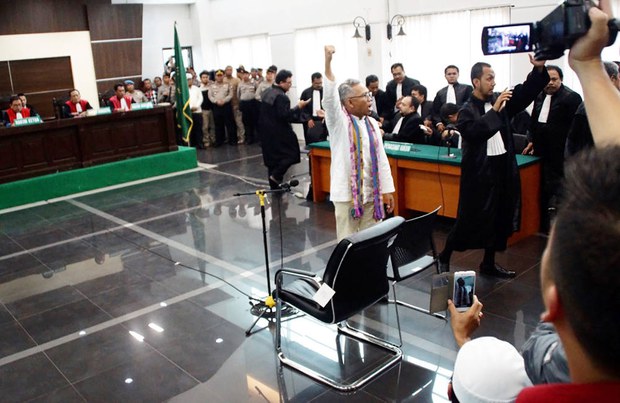Indonesia: Man Gets 18 Months for Editing, Posting Infamous ‘Ahok’ Video
2017.11.14
Bandung, Indonesia
 Buni Yani raises his fist and shouts “Allahu akbar” after being sentenced to 18 months in prison in Bandung, West Java, Nov. 14, 2017.
Buni Yani raises his fist and shouts “Allahu akbar” after being sentenced to 18 months in prison in Bandung, West Java, Nov. 14, 2017.
The man who edited and posted on social media a video-recording of a speech that led to former Jakarta Gov. Basuki “Ahok” Tjahaja Purnama being convicted of blasphemy will spend 18 months in prison, a district court ruled Tuesday.
The Bandung District Court in West Java sentenced Buni Yani, 48, after finding him guilty of violating a section of the country’s cyber law. The section regulates actions that deliberately violate the law such as changing, adding, destroying or omitting electronic information.
“For that reason, we sentence the defendant to one year and six months,” presiding judge Muhammad Saptono ordered.
The court found Buni guilty of selectively editing a September 2016 video in which Ahok warned residents of the Thousand Islands regency about people using Quranic verses for political gain. The edited video made Ahok appear like he was saying that the Quran itself deceived people.
The video went viral after it was posted online. It angered conservative Muslim groups, which then staged a series of massive street protests in Jakarta demanding that Ahok be removed from office and prosecuted for allegedly defaming Islam through the altered comments.
One of the protests, which drew some 100,000 people, turned violent. Anti-Ahok demonstrators attacked police barricades, as well as set fires and looted shops in Jakarta on Nov. 4, 2016.
On May 9, another court rejected Ahok’s argument that the edited version of his speech impacted the blasphemy charge against him. Ahok, who was defeated a month earlier in the 2017 Jakarta gubernatorial election, was sentenced to two years in prison.
Ahok’s lawyers said Buni’s sentence was too light.
“Buni Yani created chaos. With this sentence, Ahok should not have been punished at all,” lawyer I Wayan Sudirta said, according to kompas.com.
“It should be heavier than Ahok’s sentence, plus he should be sent to prison immediately,” lawyer Teguh Samudra said, according to the Jakarta Post.
Before he was convicted and sentenced, Ahok, a member of Indonesia’s ethnic Chinese Christian minority, lost his bid as the incumbent in the governor’s race against former Education Minister Anies Rasyid Baswedan, who was supported by Muslim groups.
Buni plans appeal
Buni, unlike Ahok, was not immediately sent to jail after his sentencing. He said he planned to appeal the verdict.
“All the facts of the trial were not considered by the judge,” he said.
“I’m ready to die, this is for the sake of the truth,” said Buni, who raised a clenched fist and shouted “Allahu Akbar!” as he left the courtroom. His supporters also chanted the Arabic phrase that means “God is great.”
After the sentencing, Buni’s supporters tried to push the guardrail that separates the bench from the visitors’ seating area, forcing police officers to create a barrier in front of judges’ and prosecutors’ desks.
West Java provincial police and Bandung city police deployed around 800 officers inside and outside the courtroom.
“We anticipated the presence of 500 supporters,” Bandung Police Chief Hendro Pandowo told BenarNews.
Among those who attended the five-hour trial were leaders of a series of protests against Ahok, including Islamic Defenders Front Secretary Gen. Novel Bamukmin, former People’s Consultative Assembly chairman Amien Rais and Eggi Sudjana, lawyer for the banned Hizbut Tahrir Indonesia.
Judges: burden met
In considering the verdict, the judges said Buni’s actions met all the elements necessary to prove that he had violated the 2011 Information and Electronic Transactions (ITE) Law.
A witness testified that Buni edited the one-hour and 48-minute video down to about 30 seconds and posted it on social media despite being reminded of its potential consequences. In the editing process, some keywords spoken by Ahok were deleted.
“That caused data to be lost from the original,” Judge Saptono said. “So, the element of altering or reducing electronic information belonging to someone is fulfilled.”
Human rights group: Internet freedom declined
The verdict came on the same day that Freedom House, a U.S.-based human rights organization, reported that Internet freedom declined slightly this year even though online access had improved in Indonesia.
Freedom House pointed to government efforts to block content and punish online defamation while failing to “stem rampant manipulation and intimidation along ethnic and religious lines.”
It estimated there are 43,000 news outlets worldwide, but many circulated content of questionable standards.
“Some actors took advantage of the popularity of the Internet and social media to publish an unprecedented quantity of fake reports, many disguised to look like legitimate news. Many of them sought to discredit ethnic and religious minorities,” the report said, making a specific reference to Ahok.
“In what observers described as ‘the Ahok effect,’ religious activists traced people who questioned tenets of Islam or reputed scholars on social media, and forced them to publish written apologies, sometimes violently,” it said.
![171114_ID_BuniYani_insert.jpg Buni Yani supporters wait outside the courthouse in Bandung, West Java, Nov. 14, 2017. [Arie Firdaus/BenarNews]](/english/news/indonesian/indonesia-politics-11142017175623.html/171114_ID_BuniYani_insert.jpg)
Buni Yani supporters wait outside the courthouse in Bandung, West Java, Nov. 14, 2017. [Arie Firdaus/BenarNews]







